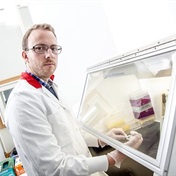Researchers claim that Internet addiction is not a figment of our imagination, says the lead author, Privatdozent Dr Christian Montag from the Department for Differential and Biological Psychology at the University of Bonn. "Researchers and therapists are increasingly closing in on it."
How the study was done
The researchers from the University of Bonn and the Central Institute of Mental Health in Mannheim compared the genetic makeup of the problematic Internet users with that of healthy control individuals. This showed that the 132 subjects are more often carriers of a genetic variation that also plays a major role in nicotine addiction.
"What we already know about the nicotinic acetylcholine receptor in the brain is that a mutation on the related gene promotes addictive behaviour," explains Dr. Montag. Nicotine from tobacco fits - just like acetylcholine, which is produced by the body - like a key into this receptor. Both theseneurotransmitters play a significant role in activating the brain's reward system. "It seems that this connection is not only essential for nicotine addiction, but also for Internet addiction," reports the Bonn psychologist.
Women more affected by this mutation
The actual mutation is on the CHRNA4 gene that changes the genetic make¬up for the Alpha 4 subunit on the nicotinic acetylcholine receptor. "Within the group of subjects exhibiting problematic Internet behaviour this variant occurs more frequently – in particular, in women," says Dr Montag.
This finding will have to be validated further because numerous surveys have found that men are more prone to Internet addiction than women. The psychologist assumes, "The sex-specific genetic finding may result from a specific subgroup of Internet dependency, such as the use of social networks or such."
Dr. Montag added that studies including more subjects are required to further analyse the connection between this mutation and Internet addiction. "But the current data already shows that there are clear indications for genetic causes of Internet addiction." He added that with the mutation, a biological marker had been found that would allow to characterise online addiction from a neuro-scientific angle. "If such connections are better understood, this will also result in important indications for better therapies," says Dr Montag.
(EurekAlert, August 2012)
Read more:
Are you an internet addict?




 Publications
Publications
 Partners
Partners














